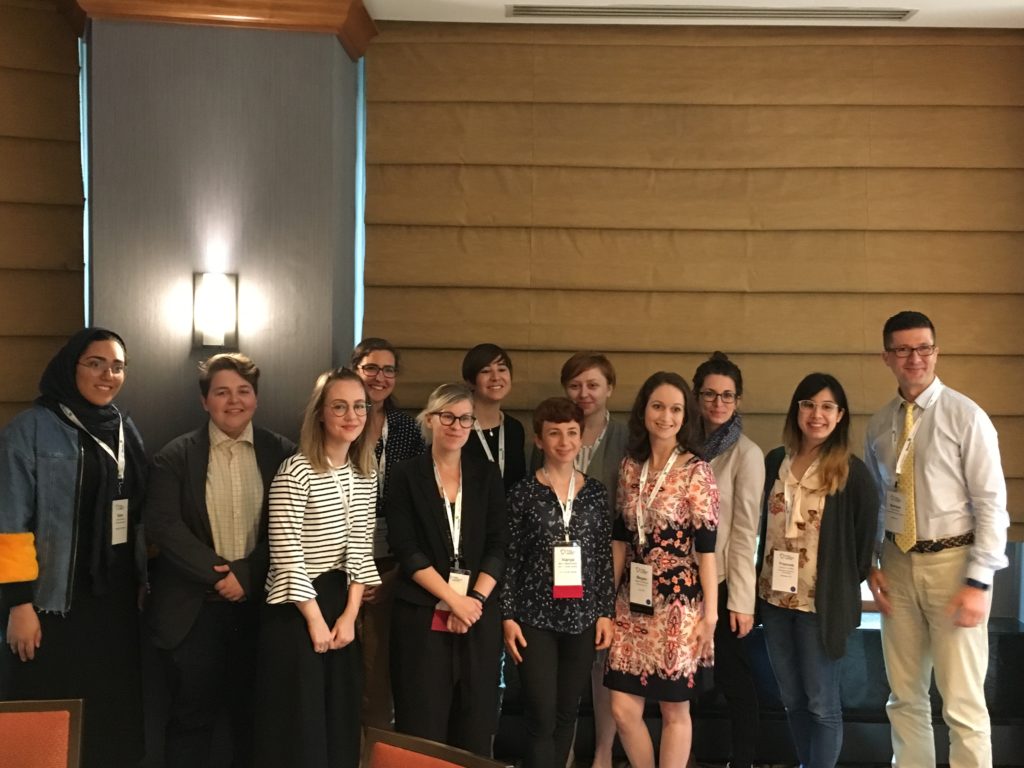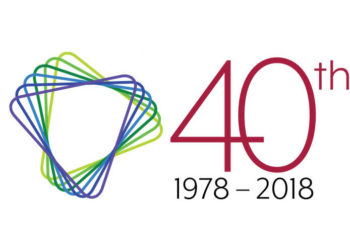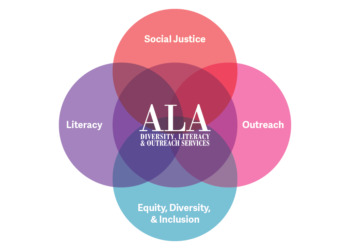This year’s SSP Annual Meeting is over. But, before we let it fade into the sunset, we wanted to get the impressions of our SSP Fellows. This year SSP had 12 fellows including early career, student and international awards. We asked the Fellows: What surprised you most about scholarly communications at the SSP Annual Meeting?
As you will see, many were happily surprised by the different stakeholders that were present, our ability to talk about the areas where we can do better, and attendees’ ability to collegially disagree with each other. There were also several mentions of Dr. Safiya Noble’s critical and thought-provoking key note. What was interesting to me was that many of the observations here from those earlier in their careers are not so different from the delegates at large. Enjoy!

Laura Simonite, Publons: I’m going to cheat a little bit, because there were actually two things that surprised me about the industry from this year’s annual meeting. The first was just how approachable everyone is. Throughout the conference I found myself easily talking, connecting (and sometimes disagreeing!) with people I know to hold senior positions in respected companies. Nonetheless, I always felt like a peer and colleague and never like I was merely being tolerated. There’s such a willingness and an openness in the community to learn from one another in a way I hadn’t anticipated, and an expectation that everyone has a valuable perspective and opinion to contribute and explore. Before the meeting I had expected to feel daunted or overwhelmed by the number of people I didn’t know, and instead found myself chatting away with new people at every opportunity from a huge range of roles, organizations and backgrounds, making connections and finding commonalities I could never have imagined.
There’s such a willingness and an openness in the community to learn from one another in a way I hadn’t anticipated, and an expectation that everyone has a valuable perspective and opinion to contribute and explore.
Alongside this, I was unexpectedly impressed by the industry’s ability to be frank with itself about where it must improve. There are undoubtedly problems within scholarly communications and publishing, with issues such as diversity, global inclusion, and evolving technologies all top of the bill and the focus of at least one session each. But where there could be a defensive instinct to highlight the positive steps and focus on where we are already improving, it became clear that the community as a whole does not shy away from confronting these issues. Speakers, and participants alike were unafraid to be blunt, clear and open about areas where progress must still be made. This was reflected not only in a comprehensive program of sessions, but also in the brave and excellent choice of Wednesday’s keynote speaker in Dr. Safiya Noble. Dr. Noble — in the spirit of this year’s theme — challenged us all to address the biases inherent in the tools we use, the work we produce, and the decisions we make, which served to underscore the theme of this year’s meeting perfectly. I’m excited to see which road the industry chooses, and plan to be along for the ride in years to come!
Monica Moniz, Cambridge University Press: Feeling surprised in 2018 is a difficult task! I mean we are living some peculiar times…
I am sure my fellow “fellows” will say how surprisingly friendly and helpful everyone was at SSP 2018, even some of our possible direct competitors. I wasn’t surprised by this, not anymore as it has consistently been my experience since I started in this business three years ago — not only at my place of work but at other, albeit smaller, scholarly publishing conferences.
I guess my answer is that I didn’t have one large revelation during the conference but I had many wonderful small surprises.
It was important to hear that artificial intelligence (AI) is a tool, not a strategy — so have a strategy and THEN choose the tool! It was very interesting to understand how the preprint servers have truly mushroomed. This means we need to come up with some standards for how we present preprints and how we sustain the servers.
Listening to Dr. Safiya Umoja Noble was a pleasure I was really not expecting to have in a publishing conference. If I had any power, I would make it mandatory for everyone in Publishing and Academia to have at least one class with her. The way she delivered her speech effortlessly and with humor, basing it on data and facts, was a masterclass on how to do a keynote! And her point about how words like diversity and inclusion having a meaning that is not empty or scattered, really hit home with me. We should fight for and protect those meanings and not let them be watered down by nonsense such as her example of cognitive diversity.
I will shamelessly steal my last nugget from a colleague, Jen Wright. Over breakfast the next day, she commented that after so many talks about data openness and sharing policies, Tim Vines made the best point. It is one that should have been obvious but it isn’t: he pointed out that a paper where we can easily access the data, the code and the protocol is just a better paper than one where you cannot. As such, the editorial choice should always be to preferably publish that. Simple?
Tim Vines made the best point. It is one that should have been obvious but it isn’t: he pointed out that a paper where we can easily access the data, the code and the protocol is just a better paper than one where you cannot.
Stephanie Savage, University of British Columbia: The SSP Annual Meeting was my first opportunity to attend a conference outside of the library world and as such I was interested to see if there would be any noticeable “cultural” differences.
Throughout the course of the Meeting, one of the things that struck me the most was the obvious enjoyment attendees took in the conference, and the general hospitality I experienced as a newcomer. I had several opportunities to observe the ease with which people interacted with me, the other Fellows, and each other. It was clear that many conference attendees had been coming for years, if not decades, and looked forward to the Annual Meeting as an opportunity to reconnect with colleagues and build new relationships. In my experience, while librarians are an insanely friendly and passionate group, they are often not particularly comfortable in the artificially constructed networking opportunities that conferences provide. I was very pleased to notice that SSP attendees don’t seem to share this discomfort – and are much quicker to get on the dance floor!
As a Fellow, I was lucky to be included in several events that provided me with a platform to meet other attendees, including SSP Board Members and Scholarly Kitchen Chefs, but the collegiality I experienced extended beyond these prearranged opportunities. For example, I had a lively conversation with a speaker (during which we very much disagreed) who approached me after noticing that I had been in the front row during his talk earlier that day. I also had a great chat with a fellow session attendee who turned to me after a thought-provoking session on AI and asked what I made of it all (to summarize, we are pretty sure we should be using AI, but don’t know how, or for what). Experiences such as these are what will likely stay with me.
Finally, I would note that as an early-career professional, I appreciate the ways in which SSP included emerging and diverse voices in the programming. Safiya Noble’s opening keynote was an invigorating start to the festivities and provided a much-needed critical lens through which I engaged with the rest of the Meeting. I hope that SSP will continue to provide a platform for conversations around equity and inclusion in the profession. I note that the Scholarly Kitchen has recently reiterated its interest in hosting guest Chefs and I hope that many will take advantage of this invitation.
Safiya Noble’s opening keynote was an invigorating start to the festivities and provided a much-needed critical lens through which I engaged with the rest of the Meeting. I hope that SSP will continue to provide a platform for conversations around equity and inclusion in the profession. I note that the Scholarly Kitchen has recently reiterated its interest in hosting guest chefs and I hope that many will take advantage of this invitation.
Alexandra Vieux Frankel, American Anthropological Association: I did not expect to find discussions about what scholarship encompasses and, indeed, what scholarship constitutes. Having come to scholarly publishing with a background in anthropology, and working in the publishing department at the American Anthropological Association (AAA), discussions about epistemology abound, whether in the articles I edit and prepare for publication or as topics that task forces explore. These resonances between my work at AAA, discussions I witness in the discipline from my position at the Association, and presentations at SSP caught me off guard, but in the best possible way.
At the Annual Meeting, this question about the scope of scholarship surfaced in several different contexts. In the “Digital Humanities: Development, Co-operation and Sustainability” session, presenters and audience members observed that repositories are pushing the bounds of what kinds of materials can be included under the umbrella of scholarship. Later, in the session on preprint servers, presenters emphasized repositories’ capacity to house forms of research — like posters and talks — that often are otherwise lost. Repositories enable the dissemination and engagement of scholarly work in different ways, transforming engagement with scholarship that is performed into texts available to the discipline and broader public.
We are having similar discussion at AAA, with our members and committees that are focused on publishing. Here too, concerns about what constitutes scholarship and how to engage with it are coalescing and giving way to exciting developments. As the Association prepares to launch a digital repository in collaboration with other anthropology-focused societies, conference papers and posters were consistently at the top of the list of what kinds of materials the repository ought to host in order to best serve the discipline.
We are having similar discussion at AAA, with our members and committees that are focused on publishing. Here too, concerns about what constitutes scholarship and how to engage with it are coalescing and giving way to exciting developments.
In this way, the development of a discipline-specific repository also became an issue of accessibility: it has the potential to make conference papers available to those interested persons who want to engage with the discipline but for whom conference attendance is not feasible.
I was surprised and delighted to hear presenters (and especially, the opening keynote speaker, Dr. Safiya Umoja Noble) address social responsibility in scholarly publishing. The matter of accessibility and the question of what scholarship encompasses. Here, I see the publishing industry echo concerns voiced by anthropologists: it’s a terribly exciting time to be involved in how these two worlds meet.
Mariya Maistrovskaya, University of Toronto Libraries: Before joining the SSP, I knew about it mostly from the Scholarly Kitchen, a resource widely read among librarians who work in scholarly communications. I have to admit that I find the progressive intellectual debate in commentaries almost as valuable and thought-provoking as the posts themselves. And it may be for that reason that the Annual Meeting surprised me with a variety of perspectives on open access, some varying greatly from what I’m used to in the library world or from the picture that Kitchen posts and commentaries often paint.
At risk of generalizing too much, I would say that for most librarians working in scholarly communications, open access is less a question and more an underlying value. The question is how to get there in an efficient and sustainable way. I appreciated encountering a variety of opinions on this topic, often quite polarized, from other attendees that illuminated some of the challenges big and small publishers face both with the concept as well as the logistics of going open. In fact, I consider this one of the most valuable takeaways from the meeting as it will certainly bring a more nuanced perspective to my conversations with local publishers and editorial teams.
Moreover, thanks to the friendly and collaborative atmosphere I felt hopeful that I will be able to join my voice with many other librarians at the SSP to address the myths and controversies surrounding open access publishing and highlight the many models and promising partnerships that can help us get there.
Moreover, thanks to the friendly and collaborative atmosphere I felt hopeful that I will be able to join my voice with many other librarians at the SSP to address the myths and controversies surrounding open access publishing and highlight the many models and promising partnerships that can help us get there.
Frances Andreu, Rochester Institute of Technology: As a librarian, my experience with the scholarly publishing industry has been in a more tertiary role, acting as support outside of the main author-to-publisher workflow. My particular role involves navigating Green open access policies and repository management, rather than working with vendors, and so I’d previously had very little direct communication with publishers and content providers. Going into my first SSP Annual Meeting, I wasn’t quite sure what to expect, but I was eager to gain viewpoints of the industry from the outside of the library.
While there were some predictable differences between the Annual Meeting and the typical academic spaces I move around in (a greater amount of suit jackets, for instance), I was pleased to find that there was a concerted effort to ensure librarians and library perspectives were represented, and not just as potential customers. Many of the sessions I attended included a librarian on the panel and there were many other librarians in attendance. Had I done my homework prior to the meeting, I would have known that SSP’s previous president, Rick Anderson, is a librarian, and therefore should not have been so surprised to find that, not only does SSP make room for librarians, but also accepts them into their leadership. That said, in the sessions I attended, the focus seemed mostly around librarians as access-providers, either through subscriptions or repositories. While this is certainly an important role that librarians play in the process, as many libraries begin to function as publishers themselves, it would be interesting to see discussion around how they fit into the existing publishing ecosystem.
…in the sessions I attended, the focus seemed mostly around librarians as access-providers, either through subscriptions or repositories. While this is certainly an important role that librarians play in the process, as many libraries begin to function as publishers themselves, it would be interesting to see discussion around how they fit into the existing publishing ecosystem.
I believe that publisher-librarian cooperation and partnerships are of increasing importance to the scholarly publishing landscape, and was glad to see such ready collaboration already exists within SSP membership and the Annual Meeting.
Ewa Zegler-Poleska, PhD student, Indiana University Bloomington: The most surprising thing about the scholarly publishing industry was to me the sheer range of stakeholders and the variety of products and services available to support all the stages of the publication workflow. So far, as a PhD student in information science and an aspiring researcher of scholarly communication, I have been following discussions on current trends in the field, including data sharing and citations, preprints, and persistent identifiers. I have been also familiar with services provided by some SSP exhibitors – particularly with those providing sources of data in scientometrics, such as Clarivate Analytics or Crossref. Obviously, I have been also using various tools and platforms as needed in my research.
But attending the SSP meeting allowed me to learn about many other vendors, technologies, and innovations, which resulted in broadening and nuancing my view of the scholarly publishing community. The report on careers made me aware of multiple ways leading into the industry and I wondered how professionals’ backgrounds might affect the publishing ecosystem. I appreciate discussions on challenges in moving beyond the journal article format as well as towards metrics of impact capturing more than citations counts. Another topic I consider important was publishers’ initiatives aimed towards integrating multimedia formats and non-academic content into the digital scholarly record to enrich it and make scientific knowledge more visible and accessible to a broader audience.
The most surprising thing about the scholarly publishing industry was to me the sheer range of stakeholders and the variety of products and services available to support all the stages of the publication workflow.
Norman Rusin, George Washington University: I went to the 40th SSP annual meeting to learn more about new technological and business developments in the scholarly communications field. However, I knew that, by having invited Safiya Umoja Noble, the meeting would be about much more than that. I was inspired by Safiya Noble’s talk about misrepresentation, classification, storage, and dissemination of information and how these categories impact society and its inner networks. In particular, I was struck by three of the questions she asked:
- What is our role in the normalization of othering?
- What is our social responsibility as publishers?
- What actions can we take on the individual, institutional, and collective levels?
Going forward, I want to connect these questions to my interests as a digital publishing student and explore how scholarly publishers can design the information architecture of digital publications in a way that is more inclusive and understanding of marginalized and underrepresented identities. In this perspective, not only do I treasure all the information I had the opportunity to obtain about accessibility and engagement—several panels addressed these issues and showcased different ways to tackle them—; but I also value this community’s curiosity and collaborative spirit in thinking about them.
Megan McCarty, J&J Editorial, LLC: I was most impressed by the strong sense of community and cooperation that SSP fostered among so many different stakeholders in the publishing industry. As a new member, I felt encouraged by the unexpected level of trust shown to fellow attendees – to fully engage and challenge one another, jump out on a limb with an idea, and even solicit and offer advice. This overriding culture of collegiality and collaboration created space for us, as a community, to address “what’s holding us back” and look ahead to how we can better meet the needs of researchers.
One topic discussed was the bigger-picture goal of reducing “waste” in the publishing ecosystem. The session on “The Gift that Keeps on Giving: Metadata and Persistent Identifiers Through the Research and Publication Cycle” showed how resources are not fully utilized when up- and down-stream stakeholders do not effectively communicate about metadata consistency, especially related to funding sources, author affiliations, and reuse licenses. If we don’t regularly audit our metadata practices and look for opportunities to collaborate on new industry standards – or communicate the importance of metadata consistency to authors – then we risk introducing delays as well as long-term waste into the publication cycle.
If we don’t regularly audit our metadata practices and look for opportunities to collaborate on new industry standards – or communicate the importance of metadata consistency to authors – then we risk introducing delays as well as long-term waste into the publication cycle.
Another perspective on waste relates to research itself – how much inaccessible research sits in someone’s desk, memory, or behind a paywall? According to Dr. Maryann E. Martone, speaking on the “Funders as Publishers” session, “scientists need to publish everything they do”, including negative results and replication studies. Solutions include the expansion of preprint servers (increasingly supported by journals themselves) and publishing platforms such as F1000. The outcome of PLOS ONE’s trial of Registered Reports, which strives to address methodological problems early and avoid publication bias against negative results, is worth watching.
Perhaps the most surprising form of waste was the observation from “Re-envisioning the Scholarly Record for Reproducibility” that the PDF itself is a format that does not give many researchers the information they need or want, especially if they wish to quickly validate and build upon the findings of their colleagues. Code Ocean addresses this need by providing readers the same computational environment of the authors, without installation within the platform of the journal. Some journals such as SoftwareX are even redefining and expanding the meaning of a publishable “result” to include software, and other journals such as G3 and F1000 have also added software and data tool article types.
While this year’s Annual Meeting has made it clear that there is work to be done, it has also shown service providers, publishers, and journals willing to innovate, accelerate collaboration, and ultimately, better serve and support researchers.
****
Special thanks to Emilie Delquie, Copyright Clearance Center, for coordinating the Fellows and wrangling their responses!



